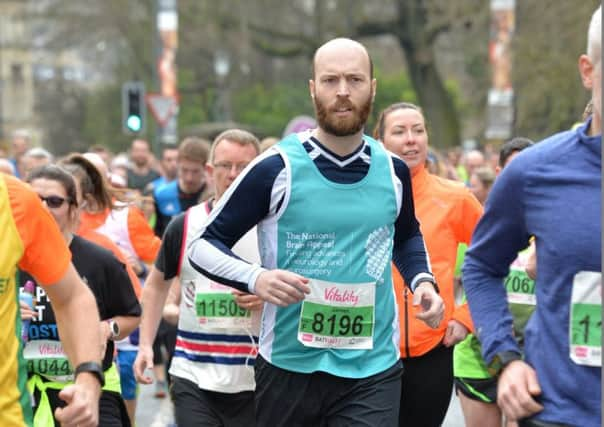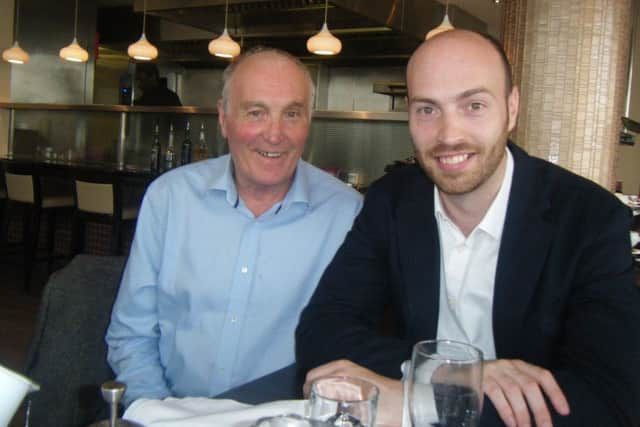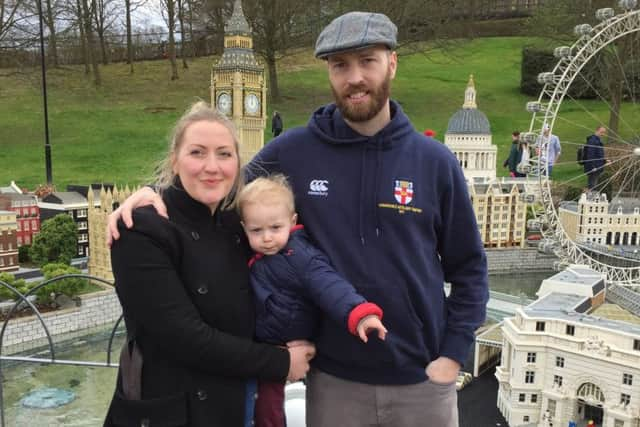Pistone man runs marathon for The National Brain Appeal charity


The father-of one, who works in the renewable eneregy industry, is putting his best foot forward for The National Brain Appeal – the charity that raises vital funds for the National Hospital for Neurology and Neurosurgery – and the Motor Neurone Disease Association.
His father Peter was treated at the hospital and took part in dementia research before he died, aged 72, in 2014.
Advertisement
Hide AdAdvertisement
Hide AdPeter, who lived in Hemel Hempstead and worked in the demolition and haulage business, was diagnosed with frontotemporal dementia (FTD) when he was 70 – although, with hindsight, his family believe he had had the disease for at least 10 years prior to the diagnosis.


He had a form of FTD with MND, a condition that had also affected his mother. So his wife Lindsay (James’s mum) had a good insight into what lay ahead for them as a family.
FTD is a rare form of dementia that can often affect younger people, typically in their 40s to 60s, and it is progressive.
James said at first his father’s symptoms were mild . . . such as making decisions that were slightly out of character, being less patient than usual and having an increased appetite for sweet foods like biscuits.
Advertisement
Hide AdAdvertisement
Hide AdHis spatial awareness was also affected. This led to a bad fall where he banged his head and sadly he seemed to go downhill rapidly afterwards. His comprehension disintegrated and outside of the immediate family, he did not recognise anyone.


James had always been in awe of his dad’s sense of direction. He said: “If I was lost, I could call him up from wherever I was in the country and he would be able to tell me what route to take.
“It was very sad to see that disappear, along with many of his other character traits.”
Peter took part in clinical trials at the National Hospital for Neurology and Neurosurgery in London’s Queen Square and donated his brain to the hospital for research after he died.
Advertisement
Hide AdAdvertisement
Hide AdJames is also taking part in research. This involves annual visits to undergo a number of checks including MRI scans, together with blood, memory and comprehension tests as well as lumbar punctures so his cerebrospinal fluid can be analysed.


He, his wife and his mother also attend Rare Dementia Support meetings.
His father’s consultant neurologist, Professor Nick Fox – director of the Dementia Research Centre – said dementia generally, and FTD particularly, had been neglected areas of research.
He said: “Our research is focused on some of these less common dementias.
Advertisement
Hide AdAdvertisement
Hide AdHe added: “We are very grateful to Peter for so generously taking part while he was able to, and to James for continuing to take part.


“This provides us with such valuable information to help us work towards finding treatments.
“We also really appreciate James’s fantastic fundraising work for The National Brain Appeal, the charity that helped fund the Dementia Research Centre, revolutionising our research capabilities and helping support families and patients with these rare and devastating conditions.”
In the last nine months of his life, Peter needed round-the-clock care which was provided by his wife Lindsay and daughter Alex, James’s sister. The siblings have a younger brother, Ben, and their parents are also guardians to Ellis, 13.
Advertisement
Hide AdAdvertisement
Hide AdJames believes he was very lucky to have been raised by such a wonderful couple. He said: “I miss my father dearly and my mother put so much into caring for him. They were married for nearly 50 years.”
He and his wife Lucinda have an 18-month-old son Hugo and his sister Alex’s son Sebastian is three months younger. Lindsay is an adoring granny to both children.
The family will be out in force to support James as he takes on the marathon on Sunday (April 23).
He admits running is not something he enjoys but explained: “I felt that by asking people to donate, I needed to take on something that was a real challenge.
“But I’m now looking forward to the day and hope to do my father’s memory proud.”
> Support James at http://uk.virginmoneygiving.com/JamesWestcott1